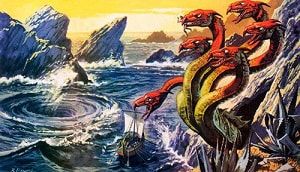What is Homer's The Odyssey?

‘The Odyssey’ is an epic tale that narrates the journey of a Greek warrior back to his home island of Ithaka. The story covers the period 1200 B.C and would have originally been part of the ‘oral’ tradition of the ancient world, that is, stories passed on via oral storytelling as opposed to books.
Scholars believed ‘The Odyssey’ was written around 800 B.C, bearing in mind the story goes back much further in time to this. The work is believed to have been ‘written’ by a poet by the name of Homer, although scholars will argue that this ‘Homer’ may well have been various poets passing on a story told by other ‘poets’ in the past.
‘The Odyssey’ is epic in scale: its characters range from the cunning Odysseus – to the witch Circe who – legend tells – could turn men into animals. There are the one-eyed giants, the lotus-eaters, ferocious sea monsters, and the enchanting Sirens – mermaid-like creatures who would lull men into their doom with their sweet voices. There are, of course, the gods of Mt. Olympus – from Athena to the sea god Poseidon – and there are even the dead telling their woes to an incredulous Odysseus in his journey to the underworld.
‘The Odyssey’ explores many themes: courage, growth, perseverance, appearance versus reality, spiritual growth and the importance of hospitality. In addition, places such as Ithaka and the everyday act of food take on rich symbolic meaning in the tale.
Although ‘The Odyssey’ narrates in vivid detail the journeys of one man some three thousand years ago, the word ‘odyssey’ (lower case) itself has come to mean journeys in all their manifestations: spiritual journeys, overcoming our demons, or literal travels to exotic locations which force us to look deep within ourselves and challenge preconceived notions and beliefs:
Keep Ithaka always in your mind.
Arriving there is what you are destined for.
But do not hurry the journey at all.
Better if it lasts for years,
so you are old by the time you reach the island,
wealthy with all you have gained on the way,
not expecting Ithaka to make you rich.
(Cavafy, Ithaka)
